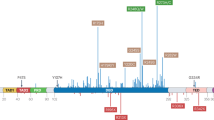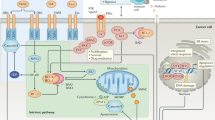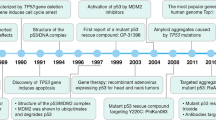Abstract
Disruption of the normal regulation of cell-cycle progression and division lies at the heart of the events leading to cancer. Complex networks of regulatory factors, the tumour microenvironment and stress signals, such as those resulting from damaged DNA, dictate whether cancer cells proliferate or die. Recent progress in understanding the molecular changes that underlie cancer development offer the prospect of specifically targeting malfunctioning molecules and pathways to achieve more effective and rational cancer therapy.
This is a preview of subscription content, access via your institution
Access options
Subscribe to this journal
Receive 51 print issues and online access
$199.00 per year
only $3.90 per issue
Buy this article
- Purchase on Springer Link
- Instant access to full article PDF
Prices may be subject to local taxes which are calculated during checkout

Similar content being viewed by others
References
Sawyers, C. L. Opportunities and challenges in the development of kinase inhibitor therapy for cancer. Genes Dev. 17, 2998–3010 (2003).
Paez, J. G. et al. EGFR mutations in lung cancer: correlation with clinical response to gefitinib therapy. Science 304, 1497–1500 (2004).
Sordella, R., Bell, D. W., Haber, D. A. & Settleman, J. Gefitinib-sensitizing EGFR mutations in lung cancer activate anti-apoptotic pathways. Science 305, 1163–1167 (2004).
Stephens, P. et al. Lung cancer: intragenic ERBB2 kinase mutations in tumours. Nature 431, 525–526 (2004).
Davies, H. et al. Mutations of the BRAF gene in human cancer. Nature 417, 949–954 (2002).
Bardelli, A. et al. Mutational analysis of the tyrosine kinome in colorectal cancers. Science 300, 949–950 (2003).
Samuels, Y. et al. High frequency of mutations of the PIK3CA gene in human cancers. Science 304, 554 (2004).
Cools, J. et al. A tyrosine kinase created by fusion of the PDGFRA and FIP1L1 genes as a therapeutic target of imatinib in idiopathic hypereosinophilic syndrome. N. Engl. J. Med. 348, 1201–1214 (2003).
Rubin, B. P. et al. Molecular targeting of platelet-derived growth factor B by imatinib mesylate in a patient with metastatic dermatofibrosarcoma protuberans. J. Clin. Oncol. 20, 3586–3591 (2002).
De Angelo, D. J. et al. Phase I clinical results with MLN518, a novel FLT3 antagonist: tolerability, pharmacokinetics, and pharmacodynamics. Blood 102 (65a), Abstr. 219 (2003).
Stone, R. M. et al. Oral PKC 412 has activity in patients (pts) with mutant FLT3 acute myeloid leukemia (AML): a phase II trial. Proc. Am. Soc. Clin. Oncol. Abstr. 22, 563 (2003).
Smith, B. D. et al., Single agent CEP-701, a novel FLT3 inhibitor, shows initial response in patients with refractory acute myeloid leukemia. Proc. Am. Soc. Clin. Oncol. Abstr. 22, 194 (2003).
Gorre, M. E. et al. Clinical resistance to STI-571 cancer therapy caused by BCR-ABL gene mutation or amplification. Science 293, 876–880 (2001).
Shah, N. P. et al. Multiple BCR-ABL kinase domain mutations confer polyclonal resistance to the tyrosine kinase inhibitor imatinib (STI571) in chronic phase and blast crisis chronic myeloid leukemia. Cancer Cell 2, 117–125 (2002).
Branford, S. et al. High frequency of point mutations clustered within the adenosine triphosphate-binding region of BCR/ABL in patients with chronic myeloid leukemia or Ph-positive acute lymphoblastic leukemia who develop imatinib (STI571) resistance. Blood 99, 3472–3475 (2002).
Shah, N. P. et al. Overriding imatinib resistance with a novel ABL kinase inhibitor. Science 305, 399–401 (2004).
Romer, J. T. et al. Suppression of the Shh pathway using a small molecule inhibitor eliminates medulloblastoma in Ptc1(+/−)p53(−/−) mice. Cancer Cell 6, 229–240 (2004).
Wolfel, T. et al. A p16INK4a-insensitive CDK4 mutant targeted by cytolytic T lymphocytes in a human melanoma. Science 269, 1281–1284 (1995).
Williams, M. E., Swerdlow, S. H. & Meeker, T. C. Chromosome t(11;14)(q13;q32) breakpoints in centrocytic lymphoma are highly localized at the bcl-1 major translocation cluster. Leukemia 7, 1437–1440 (1993).
Sawyers, C. L. Will mTOR inhibitors make it as cancer drugs? Cancer Cell 4, 343–348 (2003).
Hughes, T. P. et al. Frequency of major molecular responses to imatinib or interferon alfa plus cytarabine in newly diagnosed chronic myeloid leukemia. N. Engl. J. Med. 349, 1423–1432 (2003).
Graham, S. M. et al. Primitive, quiescent, Philadelphia-positive stem cells from patients with chronic myeloid leukemia are insensitive to STI571 in vitro. Blood 99, 319–325 (2002).
Bhatia, R. et al. Persistence of malignant hematopoietic progenitors in chronic myelogenous leukemia patients in complete cytogenetic remission following imatinib mesylate treatment. Blood 101, 4701–4707 (2003).
Chu, S. et al. Detection of BCR-ABL kinase mutations in CD34+ cells from chronic myelogenous leukemia patients in complete cytogenetic remission on imatinib mesylate treatment. Blood published online 2 September 2004 (doi: 10.1182/blood-2004-03-1114).
Hurwitz, H. et al. Bevacizumab plus irinotecan, fluorouracil, and leucovorin for metastatic colorectal cancer. N. Engl. J. Med. 350, 2335–2342 (2004).
Yang, J. C. et al. A randomized trial of bevacizumab, an anti-vascular endothelial growth factor antibody, for metastatic renal cancer. N. Engl. J. Med. 349, 427–434 (2003).
Ratain et al. ASCO annual meeting proceedings (post-meeting edn). J. Clin. Oncol. 22, (no. 14 suppl.) 4501 (2004).
Motzer et al. ASCO annual meeting proceedings (post-meeting edn). J. Clin. Oncol. 22, (no. 14 suppl.) 4500 (2004).
Kaelin, W. G., Jr Molecular basis of the VHL hereditary cancer syndrome. Nature Rev. Cancer 2, 673–682 (2002).
Bhowmick, N. A. et al. TGF-beta signaling in fibroblasts modulates the oncogenic potential of adjacent epithelia. Science 303, 848–851 (2004).
Olumi, A. F. et al. Carcinoma-associated fibroblasts direct tumor progression of initiated human prostatic epithelium. Cancer Res. 59, 5002–5011 (1999).
Author information
Authors and Affiliations
Ethics declarations
Competing interests
The author declares no competing financial interests.
Rights and permissions
About this article
Cite this article
Sawyers, C. Targeted cancer therapy. Nature 432, 294–297 (2004). https://doi.org/10.1038/nature03095
Published:
Issue Date:
DOI: https://doi.org/10.1038/nature03095
This article is cited by
-
Identification of potential biomarkers for melanoma cancer (black tumor) using bioinformatics strategy: a study based on GEO and SRA datasets
Journal of Applied Genetics (2024)
-
CRISPR-Based Gene Editing: a Modern Approach for Study and Treatment of Cancer
Applied Biochemistry and Biotechnology (2023)
-
Microsensor for Cancer Detection and MEMS Actuator for Cancer Therapy
Transactions on Electrical and Electronic Materials (2023)
-
Designed fabrication of active tumor targeting covalent organic framework nanotherapeutics via a simple post-synthetic strategy
Nano Research (2023)
-
Reconstitution of microtubule into GTP-responsive nanocapsules
Nature Communications (2022)
Comments
By submitting a comment you agree to abide by our Terms and Community Guidelines. If you find something abusive or that does not comply with our terms or guidelines please flag it as inappropriate.



